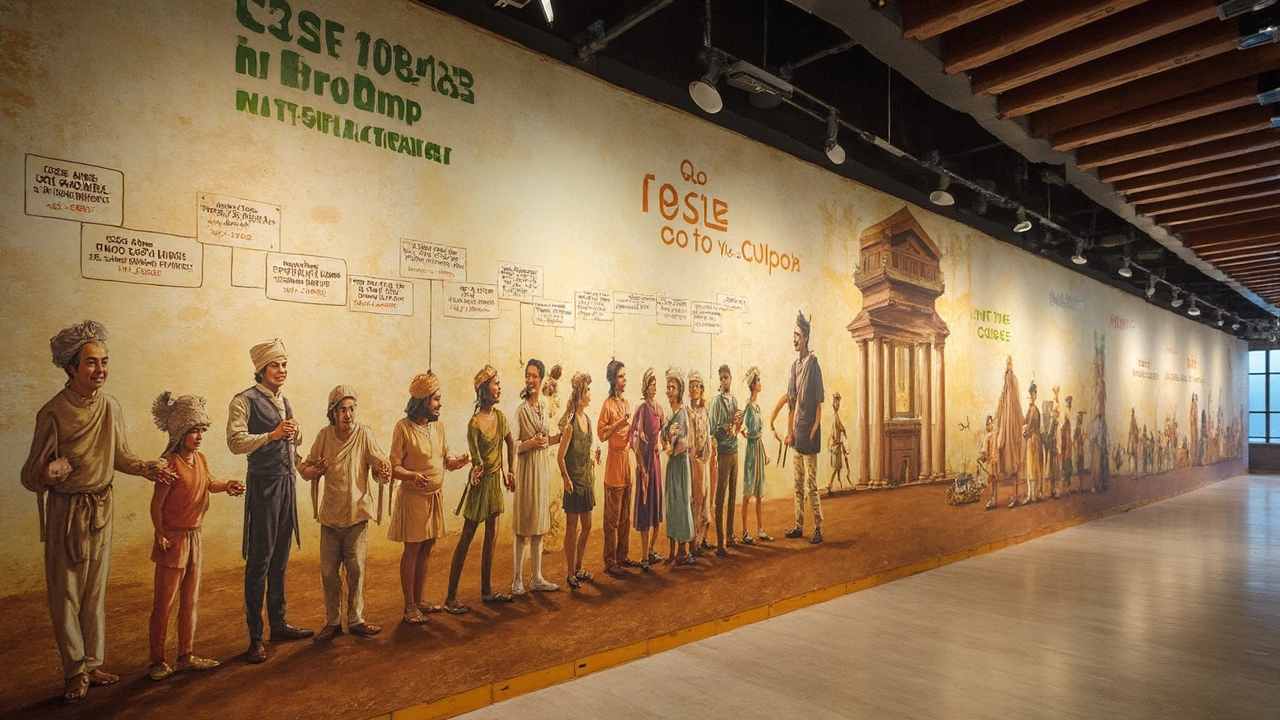Ever wondered if CBSE is just a board for folks in Delhi? You're not alone! Loads of people think the same, partly because its headquarters are smack in the middle of Delhi. But here's the scoop: CBSE, or the Central Board of Secondary Education, stretches its wings way beyond Delhi. We're talking about a board that influences students from Chennai to Chandigarh!
Founded back in the pre-independence days, CBSE has grown into a powerhouse in the Indian education scene. It's not just any board; it sets the standard for schools all over India and even abroad. So, if you're a parent trying to figure out the best fit for your child's schooling, understanding CBSE and how it ticks could be your golden ticket.
- Understanding CBSE
- Why People Think It's a Delhi Board
- CBSE's National Reach
- Key Features of the CBSE Syllabus
- Benefits of Choosing CBSE
- Tips for Navigating CBSE Curriculum
Understanding CBSE
The CBSE, or Central Board of Secondary Education, is one of India's most popular education boards. Why? Because it supervises a range of schools that stick to a uniform syllabus across the country. This uniformity can be a huge relief for parents who need to move cities because of work; their kids won't have to adjust to a completely different syllabus each time.
So, where did it all start? The board got its formal shape way back in 1929. Initially, it was created to streamline education in Delhi but quickly realized there's an entire nation that needed a guiding educational force. Its main aim was pretty straightforward: to ensure all Indian students get access to decent and equal education, no matter where they live.
CBSE's Structure and Reach
Don't think of CBSE as just a board confined to a single region. Think bigger. It does have its roots in Delhi, but now it has not only spread all over India but even overseas. As of the latest stats, CBSE affiliates over 25,000 schools across India and another 240 schools abroad! So it's pretty massive when you think about its reach.
Curriculum and Examination
The CBSE syllabus is known for being well-structured, balancing academics with extracurricular activities. They've put a lot of effort into making the syllabus logical and focused on holistic development. Exams are also standardized, which ensures fairness. The board exams for class 10 and 12 are a big deal, taken by lakhs of students, and often considered a benchmark for college admissions.
Focus on Competitive Exams
One of the cool things about CBSE is that it aligns its syllabus closely with competitive exams like JEE and NEET. If your kid dreams of becoming an engineer or doctor, studying under CBSE might give them a slight edge because they'll already be familiar with the exam patterns and topics.
| Key Stats | Data |
|---|---|
| Schools in India | 25,000+ |
| Schools Abroad | 240 |
Why People Think It's a Delhi Board
So why does CBSE wear this unofficial label of being a ‘Delhi board’? Well, there are a few convincing reasons why people often mistake it for one.
Headquarters in Delhi
The primary reason is its location. The headquarters of CBSE is smack in the middle of Delhi, leading many to believe that its focus and influence are majorly tied to the city. This geographical association, although not entirely baseless, is only a part of the story.
Proximity to Government Bodies
Then there's the connection with various central government bodies, which are also based in Delhi. This close association naturally leads to the perception that CBSE’s policies and operations are heavily influenced by the capital city.
Historical Roots
Historically, when CBSE was established, it did focus initially on certain regions around Delhi for regulatory purposes. Over the years, though, its ambit expanded, covering a lot more than just the local geography.
But wait, there's more! It's not all about location and history. There's also a practical reason why the association sticks.
High Concentration of Affiliated Schools
Delhi has one of the highest concentrations of CBSE-affiliated schools compared to other regions, making it seem like it's more of a regional body. When a lot of schools are affiliated with CBSE in a city, it often steers the perception that it’s more like a local board.
So, next time you hear someone call CBSE a Delhi board, you'll know it’s more of a confusion than a fact!
CBSE's National Reach
If you've ever doubted CBSE's influence, think again! This board is like the backbone of Indian schooling across the country. It isn't just confined to Delhi; it presides over a staggering number of schools, not only in India but also in about 25 other countries. Yep, you heard that right—CBSE isn't merely an Indian affair. It's gone global, folks!
Now, talking numbers, CBSE has affiliations with over 24,000 schools in India and about 240 schools abroad. That’s a huge presence! These schools follow the CBSE syllabus, giving students from various regions a standardized curriculum. This makes life easier for families who move cities, as kids can pick up right where they left off.
Why the National Presence?
There are a few key reasons why CBSE has penetrated so many nooks and crannies of the country. First, the syllabus is quite balanced, combining academics with important life skills. CBSE schools focus not just on theoretical learning, but also on practical experiences and co-curricular activities. Plus, CBSE’s affiliation policy is pretty straightforward, making it easier for schools to align themselves with it.
Major CBSE Impact Areas
Let's break down where CBSE's influence is most felt:
- Metropolitan Cities: Delhi, Mumbai, Kolkata, and Chennai host a significant number of CBSE schools.
- Tier-2 and Tier-3 Cities: Lucknow, Bhopal, and Kochi, among others, also showcase a large enrollment in CBSE schools.
This expansive reach allows students in different parts of the country to enjoy similar quality education, breaking the stereotype that only big-city schools provide better education.
| City | Number of CBSE Schools |
|---|---|
| Delhi | 1,800+ |
| Mumbai | 1,200+ |
| Bangalore | 950+ |
CBSE's widespread network proves its effectiveness and popularity. So next time someone says CBSE is just a Delhi board, you can chuckle a bit and perhaps even share these cool facts!

Key Features of the CBSE Syllabus
The CBSE syllabus is a hot topic among students and parents alike. Why? Because it’s known for striking a balance between comprehensive coverage and ease of understanding. Let’s chat about what makes this syllabus stand out.
Well-Structured Curriculum
Whether you’re tackling math or diving into history, CBSE keeps things organized. The syllabus is sequenced in a way that builds concepts gradually. This means your kid isn’t jumping from simple addition to calculus overnight!
Focus on Application
CBSE doesn’t just cram your brain with theory. Oh, no! It’s serious about applications. Many subjects incorporate practicals and projects, ensuring students apply what they learn directly. So if you're into science, expect some hands-on experiments.
Wide Subject Range
You know when people say variety is the spice of life? The CBSE board lives by it! From arts to commerce, and the usual science and math, there’s something for everyone. No more feeling pigeonholed.
Standardized Exams
CBSE schedules its exams across the nation, ensuring uniformity. Every student faces the same question paper, making the playing field fair, whether you’re in a big city or a small town.
| Subject | Practical Component (%) |
|---|---|
| Science | 20% |
| Math | 10% |
| Geography | 30% |
Emphasis on Critical Thinking
It’s not just about rote learning here. The syllabus is crafted to sharpen analytical and critical thinking skills. So when you're neck-deep in social studies, it's not just dates but why events happened and their impact.
All these features of the CBSE syllabus make it a go-to choice for many schools across the nation. Let’s be real, such a formula hardly fails to impress!
Benefits of Choosing CBSE
Picking the right board for your child's education is a big deal, and CBSE continues to be a popular choice. So, what makes it stand out?
National Recognition
One major draw is that CBSE is nationally recognized. If your family moves around a lot, this can be a lifesaver. The curriculum is the same across India, which makes transitioning schools smoother for students.
Student-Friendly Syllabus
Parents often praise CBSE for having a syllabus that's more student-friendly. The focus is on understanding and knowledge application rather than rote memorization. This method not only makes learning more enjoyable but also prepares students for competitive exams like the JEE and NEET.
Comprehensive Curriculum
CBSE syllabus covers a wide range of subjects, balancing core subjects like Math and Science with languages and social studies. Plus, there are options for co-curricular activities, giving students a well-rounded education.
Focus on Skill Development
Besides academics, CBSE puts emphasis on developing critical life skills. Activities focused on problem-solving, decision-making, and communication are integrated into the curriculum. This holistic approach molds students into confident individuals ready to face real-world challenges.
Inclusive of Competitive Exams
Most competitive exams in India align closely with the CBSE syllabus. For students eyeing top engineering or medical colleges, CBSE offers a head start. The exam pattern and structure help students get accustomed to the format they'll encounter in competitive exams.
- Unique advantage: Simplified exam pattern focusing on fewer but more comprehensive questions.
- Grading system based on percentile, giving a clearer view of one's standing compared to peers.
| Exam | Corresponding Syllabus |
|---|---|
| JEE Main | CBSE Physics, Chemistry, Math |
| NEET | CBSE Biology, Chemistry, Physics |
All these perks definitely put CBSE high on the list for any parent or student considering options for school education. It's not just about academics; it's about nurturing all-rounded individuals.
Tips for Navigating CBSE Curriculum
Tackling the CBSE curriculum isn't as daunting as it might seem. Whether you're a student or a parent trying to help out, there are some solid strategies to keep you ahead of the game.
Understand the Syllabus
The first step? Get friendly with the syllabus. Every subject in the CBSE has a detailed syllabus available. It outlines what topics you’ll cover, the weight each topic carries, and often even some reference books. Make sure you know what's expected right from the start.
Plan Your Study Schedule
Time management is your new best friend. Break down the syllabus into manageable chunks and set weekly targets. It’s like eating a pizza—much easier one slice at a time than swallowing it whole!
Focus on NCERT Books
NCERT books are the holy grail for CBSE exams. Most exam questions are directly from these, so make sure you’re comfy with each one of them. Don’t just skim—dig deep, understand examples, and work through the exercises.
Practice with Sample Papers
Don't wait until the last moment to start practicing. Dive into previous years' question papers and sample papers. They're like a sneak peek into what the examiners are thinking. You'll get a feel for the exam pattern and types of questions.
Utilize Online Resources
The internet is like a treasure trove for students. Websites, educational platforms, and YouTube are full of tutorials that can help break down complex concepts. Just be careful not to get lost in the sea of information. Stick to verified resources.
Stay Updated with Changes
The CBSE often makess updates, be it changes in the assessment pattern or curriculum. Keep an ear to the ground so that nothing catches you off-guard.
CBSE isn’t just a board—it's a robust educational framework. With clear goals, consistent work, and a few smart tips under your belt, navigating the CBSE syllabus can be a breeze!



